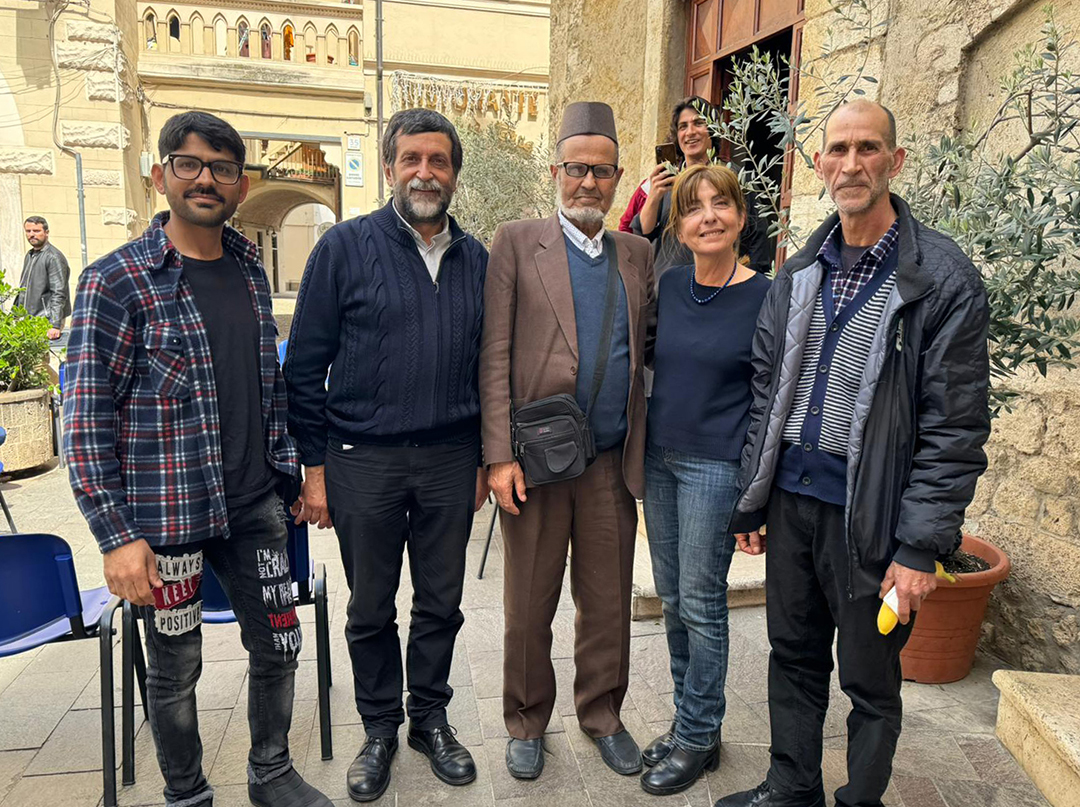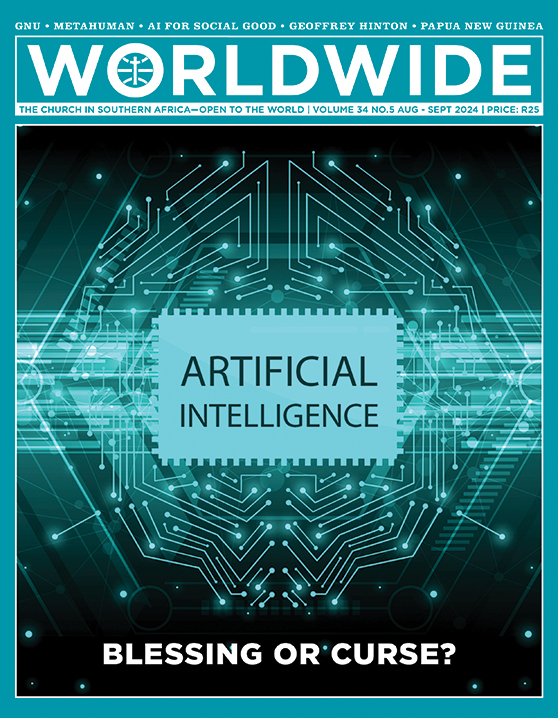
ARTIFICIAL INTELLIGENCE: BLESSING OR CURSE?
The image, according to Chat GPT, features the phrase “ARTIFICIAL INTELLIGENCE” at its centre, overlaid on a stylized depiction of a microchip and circuitry. This design symbolizes the integration of advanced AI technologies within modern electronic systems, emphasizing the critical role of AI in driving technological innovation and enhancing computational capabilities across various industries.
CHALLENGES • THEOLOGICAL REFLECTION
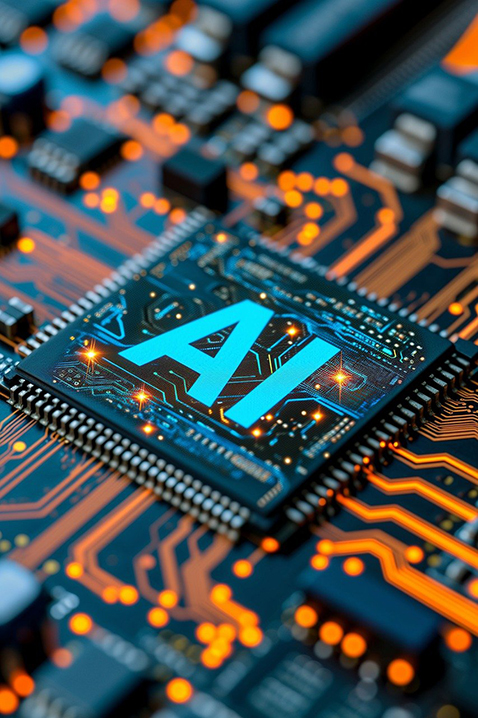
AI AND THE QUESTION OF HUMAN SUFFERING
In this reflection the author discusses the role of Artificial Intelligence (AI) and advanced technology amid certain forms of human suffering, often caused by personal interests at the expense of others. He suggests that technology is not neutral and ponders how AI and other technologies can address the questions of poverty, failing healthcare systems, unemployment and overall human misery experienced by those at the margins of society.
BY FABIAN ASHWIN OLIVER | YOUTH MINISTER, JOHANNESBURG
I recently read a social media post concerning the first person to receive Elon Musk’s Neuralink brain implant chip. The implant was designed to help a person, paralyzed from the shoulders downwards, control a computer and smartphone using their mind (Salzman et al 2024). While I felt excited about this invention and modern technology in general, it also raised theological questions for me—how far can such inventions go before we question if humans are playing God? Ethical questions emerge regarding right and wrong, and the extent of accountability when technology, potentially altering decisions, is inserted into human bodies. However, the question that stayed with me concerns the accessibility of such inventions, along with the potential of technology to alleviate human suffering caused by social, corporate, and institutionalized power. It intrigues me that despite our evolutionary advancements in AI and other technologies, issues like poverty, unemployment, death from curable sicknesses, and inequality remain prevalent.
Technology Is Not Impartial
Like most human inventions, technology is not neutral. It exists within a particular context, embodying concepts, ideologies, science, and human imagination. In a certain sense, it is similar to Scripture. The Bible can—and has been—used for destructive purposes throughout history but is also used for liberation and fostering authentic relationships with the divine. What good can the Bible or Christianity bring if they are used to enhance religious fundamentalism, racism, glorified patriarchy, or holistic exclusion? What value do they have if they promote shame over grace, hatred over peace, and indifference over love? Similarly, what good is technology if it remains inaccessible to the poor majority of South Africans? What is the point of a world-class healthcare system if it only serves the financially privileged and not those born into poverty? If Jesus’ life is meant for everybody and every creature, shouldn’t AI inventions reflect this deep theological awareness?


I am conscious that certain inventions and technologies emerged in contexts of sadistic human slavery. As some thinkers have noted, certain technological advances run parallel with “unprecedented poverty, hunger, death of children, unemployment, misery, and the destruction of nature” (Mdingi 2022: 578). While this does not imply that all technology is bad, it does necessitate pondering its role for the common good of ordinary citizens. For instance, in certain parts of the United States, newly AI-powered vending machines now serve bullets (firearm ammunition) at the click of a button (Hindy 2024). Although some may praise the innovative access to such items, we must consider the underlying motives in a country characterized by unprecedented gun violence, often marked by anti-black racism, police brutality, and school shootings. Research titled Does Technology Have Race? (Hankerson et al 2016) discusses several case studies revealing how technologies continue to be less accessible to people of color. In South Africa, we must confront the reality that despite progressive developments like the Fourth Industrial Revolution, the rise of the Digital Era, and new possibilities such as ChatGPT, for most of the poor, their social conditions remain unchanged. As Vellem (2015: 2) notes, “the more things change, the more they stay the same.”
AI and the Question of Love
The prevalence of information and automation comfortably offered by various AI programs is noteworthy. While we cannot expect technology to end all suffering, we can certainly hope it will not exacerbate it. Neither AI nor ChatGPT can fully resolve questions around the meaning of life. In Douglas Adams’ classic novel series, The Hitchhiker’s Guide to the Galaxy (1979), highly intelligent pan-dimensional entities task a supercomputer, ‘Deep Thought,’ with uncovering the answer to the ultimate question of life, the universe, and everything else. It takes Deep Thought seven and a half million years to calculate and verify the answer, which ultimately turns out to be 42. The answer appears meaningless because the entities lacked knowledge of the actual question regarding the meaning of life. Similarly, while leaving space for the unknowable mysteries of God and life, we should always discern the purpose of modern technologies in light of our common humanity and the sustenance of Mother Nature.
While we cannot expect technology to end all suffering, we can certainly hope it will not add more.
I want to imagine AI not only in terms of knowledge for some but for everyone. I agree with philosopher Cornel West, who says, “I am highly suspicious of the cult of smartness. Let the phones be smart, but we need to be wise. We need to have compassion” (Maniar 2018). I envision technology as a means of creating employment opportunities for the poor, fostering development in rural communities, and promoting equality in racialized, cis-patriarchal, exclusionary settings. More precisely, I want to think of it in ways that allow us to truly love and be loved. Theologian Leonard Boff notes the work of medical researchers who found that “love, cooperation, solidarity, and compassion are inscribed in our DNA by nature and not simply by a personal or social project” (Boff 2021). This intrinsic value reflecting the best, or truth, of who we are ought to be reflected in and sustained by AI and related technologies.
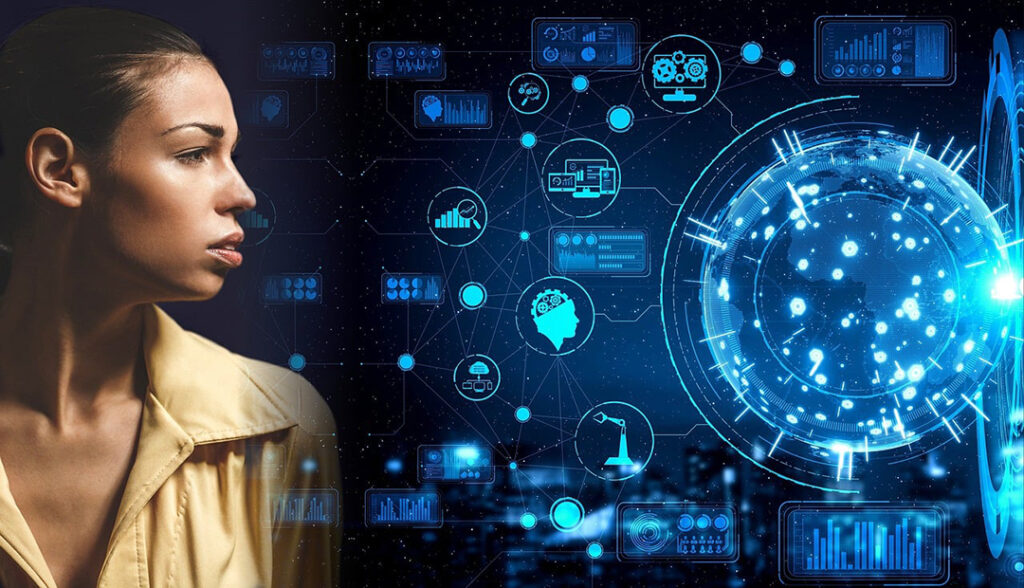
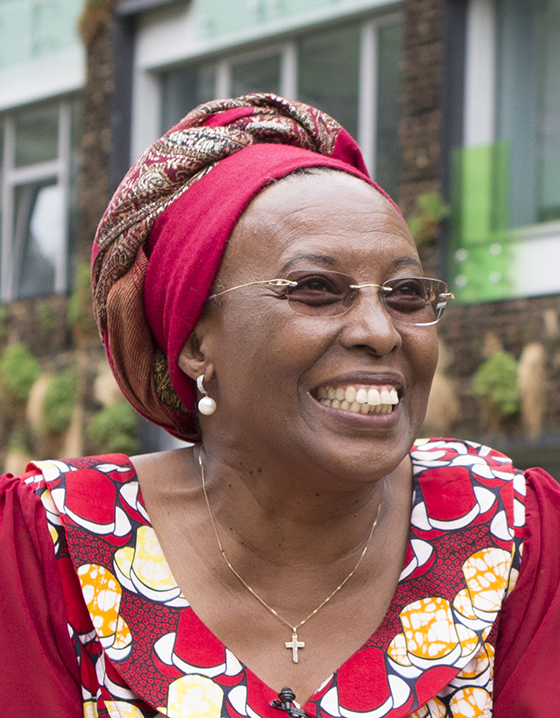
What if we thought of AI and new technologies not in terms of better life conditions for those with privileged access, or profitability and ownership, but as extensions of our human capacity to love ourselves, to love others, and to witness the love and splendour of God? Burundian humanitarian activist Maggy Barankitse, relying on her African Christian spirituality in her socio-political engagements, says, “Love has made me an Inventor” (Katongole 2011:178). Maggy believes that love alone can drive us to invent a life-giving social future for Africa. If we acknowledge that technology can be life-giving but also deeply oppressive in sustaining systems of deficiency, could we muster the courage to actively sustain and develop systems of knowledge, ingenuity, and innovation focused on resisting oppression? Could we build an alternative world in which the Kingdom of God is realized, where the last and the least are also taken into account?
“Let the phones be smart, but we need to be wise. We need to have compassion.”
In considering the questions of human suffering and the role of new technology through the lens of love, we observe the many crosses that still remain in our world today—where we exclude others and ourselves because of our human choices. Yet, we also see the endless possibilities of hope and love and our need to act upon them. As the axiom goes, if not us, who? If not now, when? (words from the Jewish scholar Hillel the Elder). I am also encouraged by Jesus’ words proclaiming that we have the divine in us and that we can do even greater things in this life and the life that is coming (John 14:12).

